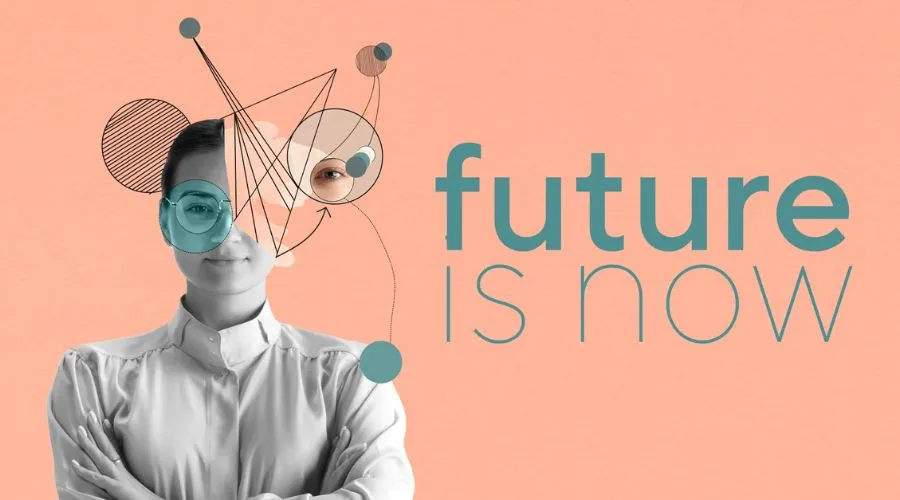6 Learning Competencies of the 21st-Century
.webp)
The learning method at Tomorrow University of Applied Sciences is based on 6 research-based pillars designed to educate the change makers of tomorrow.
Each pillar serves a distinct purpose and leads to valuable learning outcomes. These sought-after competencies are in high demand by forward-thinking companies and sustainable leaders who are shaping the future.
So what are the competencies needed to drive change in the 21st-century?
- Cognitive proficiency
- Technological mastery
- Self-empowerment
- Entrepreneurial mindset
- Sustainability mindset
- Social intelligence

The six essential learning competencies of the 21st-century encompass a holistic approach to education and personal development. Cognitive proficiency equips individuals with critical thinking, problem-solving, and adaptability skills to navigate complex challenges. Technological literacy empowers them to harness and leverage technology effectively. Self-empowerment fosters a sense of agency and self-awareness, enabling individuals to drive their own growth. Entrepreneurial mindset instills innovation, resilience, and creative thinking for pursuing opportunities. Sustainability mindset promotes responsible decision-making in the context of environmental and societal well-being. Finally, social intelligence cultivates empathy, communication, and collaboration skills to thrive in diverse and interconnected communities. Together, these competencies form a comprehensive framework for success and meaningful contribution in the modern world. Learn more abouteach one below.
1. Cognitive proficiency
Cognitive proficiency refers to the ability to process information, understand concepts, and think critically. It is a measure of a person's cognitive abilities and skills, including perception, memory, attention, reasoning, problem-solving, and decision-making.
Individuals who have strong cognitive proficiency can learn and understand complex concepts and ideas more easily, analyze and interpret information effectively, and make sound decisions based on critical thinking. Cognitive proficiency is often associated with higher levels of academic achievement, professional success, and overall well-being.
We need people who can think critically, analyze large amounts of data, and make decisions based on that data. In times of information overload, this has never been more important. We need to question the status quo.
2. Technological mastery
Technological mastery refers to the ability to understand and use technology effectively in daily life. It is the knowledge, skills, and attitudes necessary to use and interact with technology to solve problems and achieve goals.
A deep understanding of technology, its impact, and how to best use it to drive sustainable change. We need to understand the mechanics of technology to solve our society's biggest problems today. Maybe that is through coding, developing sustainable products, or AI.
3. Self-empowerment
Self-empowerment is the process of taking control of one's own life, setting goals, making decisions, and taking actions that lead to personal growth and success. It involves developing a sense of confidence, resilience, and self-efficacy that allows individuals to overcome obstacles and achieve their desired outcomes.
We need people who are aware that they can drive change and with strong self-efficacy — someone who knows their strengths and weaknesses — and uses them to navigate our ever-changing world.
4. Entrepreneurial mindset
An entrepreneurial mindset is a way of thinking and approaching problems that is characteristic of successful entrepreneurs. It is characterized by a set of attitudes and behaviors that enable individuals to identify and pursue opportunities, take calculated risks, and persist in the face of challenges.
An entrepreneurial mindset is not just for entrepreneurs but can also benefit employees and individuals in an intrapreneurial setting. By adopting an entrepreneurial mindset, individuals can become more innovative, creative, and effective in their work and achieve greater success and satisfaction in their personal and professional endeavors.
5. Sustainability mindset
We need people who can understand the impact of their behavior on the world. A sustainability mindset is a way of thinking and approaching problems considering the long-term impacts on the environment, society, and economy. It is characterized by a set of attitudes and behaviors that prioritize the conservation of natural resources and the well-being of people while promoting economic growth and prosperity.
Understanding systems, such as the United Nations 17 Sustainable Development Goals (SDGs), has never been more critical. The SDGs are a set of global targets aimed at addressing some of the world's most pressing economic, social, and environmental challenges. They were adopted by the UN General Assembly in 2015 and represent a universal call to action to end poverty, protect the planet, and ensure that all people enjoy peace and prosperity. The 17 SDGs are:
- No poverty: End poverty in all its forms everywhere.
- Zero hunger: End hunger, achieve food security and improved nutrition, and promote sustainable agriculture.
- Good health and well-being: Ensure healthy lives and promote well-being for all at all ages.
- Quality education: Ensure inclusive and equitable quality education and promote lifelong learning opportunities for all.
- Gender equality: Achieve gender equality and empower all women and girls.
- Clean water and sanitation: Ensure availability and sustainable management of water and sanitation for all.
- Affordable and clean energy: Ensure access to affordable, reliable, sustainable, and modern energy for all.
- Decent work and economic growth: Promote sustained, inclusive, and sustainable economic growth, full and productive employment, and decent work for all.
- Industry, innovation, and infrastructure: Build resilient infrastructure, promote inclusive and sustainable industrialization, and foster innovation.
- Reduced inequalities: Reduce inequality within and among countries.
- Sustainable cities and communities: Make cities and human settlements inclusive, safe, resilient, and sustainable.
- Responsible consumption and production: Ensure sustainable consumption and production patterns.
- Climate action: Take urgent action to combat climate change and its impacts.
- Life below water: Conserve and sustainably use the oceans, seas, and marine resources for sustainable development.
- Life on land: Protect, restore, and promote sustainable use of terrestrial ecosystems, sustainably manage forests, combat desertification, and halt and reverse land degradation and biodiversity loss.
- Peace, justice, and strong institutions: Promote peaceful and inclusive societies for sustainable development, provide access to justice for all, and build effective, accountable, and inclusive institutions at all levels.
- Partnerships for the goals: Strengthen the means of implementation and revitalize the global partnership for sustainable development.
The SDGs are interconnected and cannot be achieved in isolation. They require collaborative efforts from all stakeholders, including governments, businesses, civil society organizations, and individuals, to create a more sustainable future for all.

6. Social intelligence
Social intelligence refers to the ability to understand and navigate social situations and to communicate and interact with others effectively. It involves many skills, including empathy, active listening, effective communication, and the ability to read and interpret social cues.
People who possess high levels of social intelligence can connect with others on an emotional level, understand their needs and perspectives, and effectively communicate their own ideas and feelings. They are often skilled in conflict resolution, negotiation, and collaboration and can build strong relationships with others. Some critical components of social intelligence include:
- Empathy: The ability to understand and share the feelings of others.
- Active listening: The ability to fully concentrate on what someone is saying, and to demonstrate that you understand their message.
- Effective communication: The ability to express your thoughts and ideas clearly and effectively, while taking into account the perspectives of others.
- Social awareness: The ability to read and interpret social cues, and to understand the dynamics of social situations.
- Influence: The ability to persuade and inspire others, while maintaining positive relationships.
- Conflict resolution: The ability to effectively resolve conflicts and negotiate solutions to problems.
Social intelligence is an important skill in many contexts, including the workplace, social situations, and personal relationships. People who possess high levels of social intelligence are often able to build strong, supportive relationships with others, and are more likely to succeed in both their personal and professional lives. Social intelligence is also important for building diverse and inclusive communities, as it helps individuals to understand and appreciate the perspectives and experiences of people from different backgrounds.
If you are interested in gaining these competencies through challenge-based and innovative methods, join our international community and check out our program offerings to see how you can gain these six competencies.

.svg)



.webp)

.webp)
.webp)
